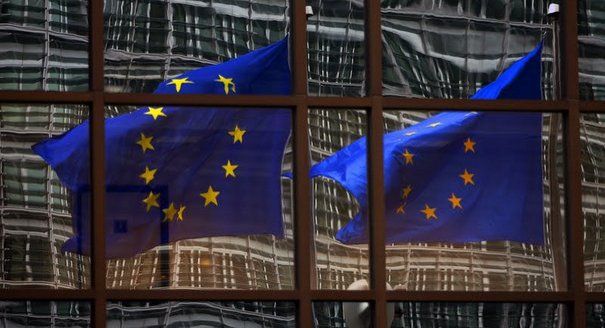Nathalie Tocci, Jan Techau
{
"authors": [
"Jan Techau"
],
"type": "commentary",
"blog": "Strategic Europe",
"centerAffiliationAll": "",
"centers": [
"Carnegie Endowment for International Peace",
"Carnegie Europe"
],
"collections": [],
"englishNewsletterAll": "",
"nonEnglishNewsletterAll": "",
"primaryCenter": "Carnegie Europe",
"programAffiliation": "",
"programs": [],
"projects": [],
"regions": [
"Europe",
"North America"
],
"topics": [
"EU"
]
}
Source: Getty
Will EU Foreign Policy Save the Integration Process?
The EU’s foreign and defense policies are not the logical next steps toward further integration. But without them integration might become even shallower than it is today.
The relationship between the European integration project and EU foreign policy has always been a shaky one. In line with the fact that the EU’s primary task, from its outset, was to make war less likely among European nations, foreign policy never played a major role in the EU until fairly recently.
Some say that is still by and large the case today. Others say the EU has made a lot of progress. But even optimists acknowledge that given the shared strategic needs of the 28 member states, the EU’s Common Foreign and Security Policy (CFSP) and Common Security and Defense Policy (CSDP) are still hugely underperforming.
To assign foreign policy its proper place in the EU integration process, observers should bear two things in mind.
First, the ultimate goal of the CFSP and CSDP is not to bring about more integration. Their ultimate goal is to make and keep the continent free, safe, and prosperous.
When I was asked to testify before the European Parliament’s Security and Defense Subcommittee a few weeks ago, I discovered how Euroskeptics such as the British Conservative Member of the European Parliament Geoffrey Van Orden twist and spin every argument just to portray the entire debate about European foreign and security policy as a big plot to bring about political integration.
I wasn’t angry so much about this silly and very predictable adage as about the obvious lack of interest Van Orden showed in the actual arguments and issues. The sole purpose of his presence at the parliament’s hearing was to undermine the debate and to provoke a slanging match that would produce the kind of juicy soundbite he could then take back home to reinforce his reputation as an upright warrior against “Brussels madness.”
Thankfully, there were quite a few other parliamentarians present that day who showed a stronger work ethic and engaged in a serious and substantive discussion.
The bottom line is that Europe’s desired end state—freedom, peace, prosperity—is more important than the process by which it gets there. I am agnostic as to whether achieving that goal will require more or less EU integration. Whatever works is good for me.
But I am absolutely sure that if Europeans are to think more strategically about their role in the world and about ensuring a bright future for the continent in a rapidly changing world, then relying on NATO and the United States alone would be foolish.
Europeans should use all available channels to bring about that culture shift, and that clearly includes the EU. That does not mean that more European integration is imminent. Quite on the contrary, in fact. There are no clear signs of significant steps in that direction anytime soon.
The second point to keep in mind when assessing the role of EU foreign policy is that treating the CFSP and CSDP as low-priority elements in the debate about the future of Europe is counterproductive. While it may currently be fashionable to do so, that would not only be detrimental to European interests around the world, but it might actually hasten the breakup of the EU as a whole. That is because, for more and more member states, the EU is becoming a useful and promising vehicle to promote their foreign and security interests.
These member states can be divided into three groups. First are the smaller countries whose only way to be influential is through Brussels. Second are the states who have lost confidence that NATO and the United States still stand firm to protect them if needed; these include many Central European nations, most notably Poland. Third are those for whom the EU can be the occasional means for fulfilling some grand geopolitical aspiration that lies outside their individual capacity; these include a teeth-clenching UK.
For many countries, EU foreign policy is their last remaining expectation of Brussels after the huge disappointments the bloc has caused in other areas. In particular, this group includes the United States, which thinks little of the EU’s internal workings but has learned to appreciate, fear, and respect its powerful role in international trade, and therefore in international sanctions regimes.
One thing is clear: foreign policy is unlikely to be “the next big thing” in EU integration. It does not have the horsepower to drive the entire apparatus forward or to restore Europe’s old intrinsic magic that seems to have faded away. But without a stronger common foreign policy, the EU will lose the allure of membership and the interest of its global partners.
The CFSP and CSDP are not the logical, unavoidable next steps toward further EU integration. But without them integration might become even shallower than it is at the moment.
About the Author

Director, Europe Team, Eurasia Group
Techau is director with Eurasia Group's Europe team, covering Germany and European security from Berlin. Previously, he was director of Carnegie Europe.
- Can Europe Trust the United States Again?Commentary
- Pre-Reformation Europe and the Coming SchismCommentary
Jan Techau
Recent Work
Carnegie does not take institutional positions on public policy issues; the views represented herein are those of the author(s) and do not necessarily reflect the views of Carnegie, its staff, or its trustees.
More Work from Strategic Europe
- Europe on Iran: Gone with the WindCommentary
Europe’s reaction to the war in Iran has been disunited and meek, a far cry from its previously leading role in diplomacy with Tehran. To avoid being condemned to the sidelines while escalation continues, Brussels needs to stand up for international law.
Pierre Vimont
- Taking the Pulse: Can European Defense Survive the Death of FCAS?Commentary
France and Germany’s failure to agree on the Future Combat Air System (FCAS) raises questions about European defense. Amid industrial rivalries and competing strategic cultures, what does the future of European military industrial projects look like?
Rym Momtaz, ed.
- Macron Makes France a Great Middle PowerCommentary
France has stopped clinging to notions of being a great power and is embracing the middle power moment. But Emmanuel Macron has his work cut out if he is to secure his country’s global standing before his term in office ends.
Rym Momtaz
- How Europe Can Survive the AI Labor TransitionCommentary
Integrating AI into the workplace will increase job insecurity, fundamentally reshaping labor markets. To anticipate and manage this transition, the EU must build public trust, provide training infrastructures, and establish social protections.
Amanda Coakley
- Can Europe Still Matter in Syria?Commentary
Europe’s interests in Syria extend beyond migration management, yet the EU trails behind other players in the country’s post-Assad reconstruction. To boost its influence in Damascus, the union must upgrade its commitment to ensuring regional stability.
Bianka Speidl, Hanga Horváth-Sántha











